- Space Opera, Act I: Thoughts on Stellaris
- Stellaris, one year on
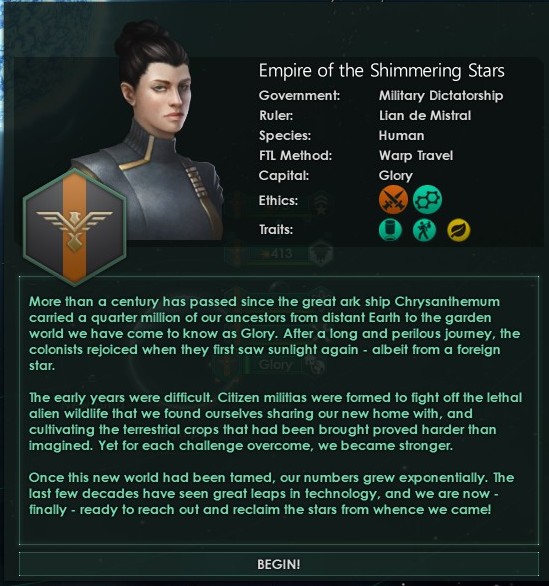 Humanity triumphant! My first game of Stellaris was a short one, as my fledgling humans were ground to dust by a nearby computer player. My second was more successful. Under the banner of the Empire of the Shimmering Stars, humanity spread out from the Deneb system – befriending the pre-spaceflight Immathurans, bringing more species and more worlds under its sway.
Humanity triumphant! My first game of Stellaris was a short one, as my fledgling humans were ground to dust by a nearby computer player. My second was more successful. Under the banner of the Empire of the Shimmering Stars, humanity spread out from the Deneb system – befriending the pre-spaceflight Immathurans, bringing more species and more worlds under its sway.
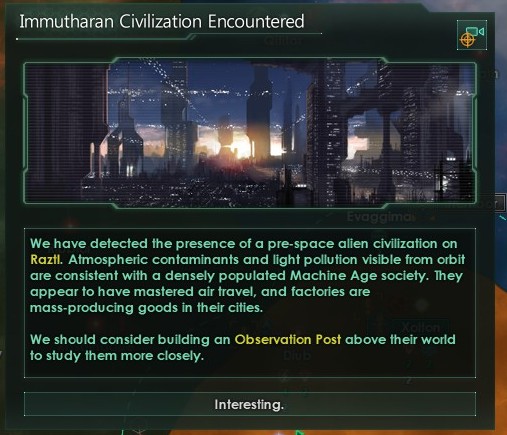 Some of humanity’s neighbours turned out to be friendly, or at least benevolent neutrals. I signed migration treaties, allowing us to populate one another’s worlds. Some were hostile. When my first spacefleet was destroyed in a bid to protect my Immathuran proteges, I built a second one, the Remembrance Fleet. The Remembrance Fleet went on to turn the tables, and the would-be aggressors became first vassals and then subjects.
Some of humanity’s neighbours turned out to be friendly, or at least benevolent neutrals. I signed migration treaties, allowing us to populate one another’s worlds. Some were hostile. When my first spacefleet was destroyed in a bid to protect my Immathuran proteges, I built a second one, the Remembrance Fleet. The Remembrance Fleet went on to turn the tables, and the would-be aggressors became first vassals and then subjects.
On and on the human tide rolled, until finally I stretched too far. The Ubaric Progenitors, an ancient “Fallen Empire” (ornery precursor races populating the Stellaris galaxy), objected to my colonies near their borders. The Remembrance Fleet fought them off – just. I attempted to take the war to the Ubari capital, an ancient ringworld. It was a disaster: the combined Ubari forces crushed mine. In the ensuing peace treaty, the Ubari forced me to abandon a swathe of colonies, and to add insult to injury, assassinated my leader.
Fortunately, the Shimmering Stars had the size and strategic depth to recover. Rebuilt newer and stronger, my Grand Fleet fought off an extra-galactic invasion (one of Stellaris’ “late-game crises”)… and returned to unfinished business. Once again, a human fleet, supported by allied and vassal contingents, appeared above the Ubari ringworld.
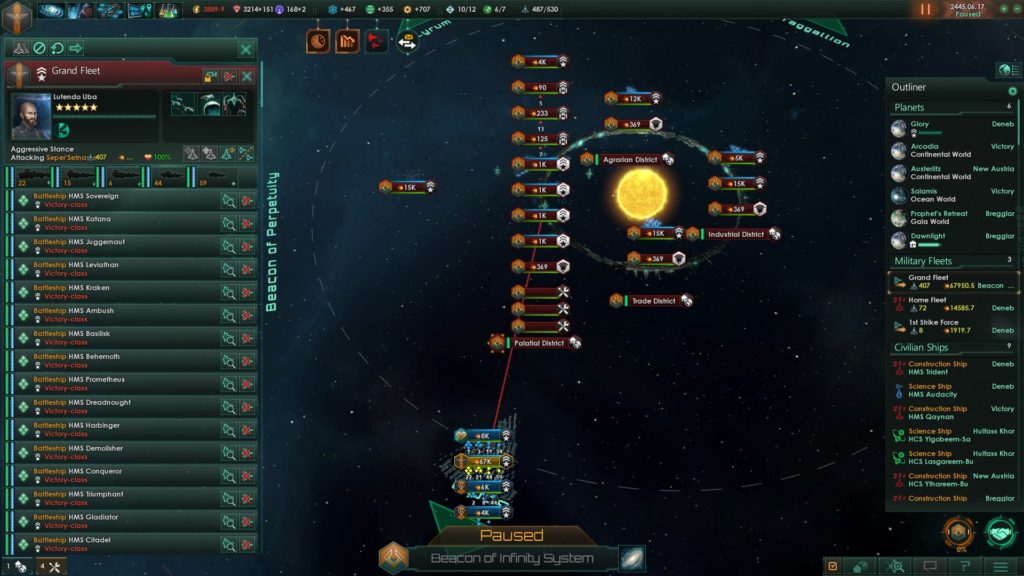 This time, the allies outgunned the Ubari several times to one. One by one, the Ubari warships and starbases winked out. The Ubari leaders surrendered. The bronze eagle flag of the Shimmering Stars flew over a ringworld that was already old when the first humans rubbed sticks together to make fire.
This time, the allies outgunned the Ubari several times to one. One by one, the Ubari warships and starbases winked out. The Ubari leaders surrendered. The bronze eagle flag of the Shimmering Stars flew over a ringworld that was already old when the first humans rubbed sticks together to make fire.
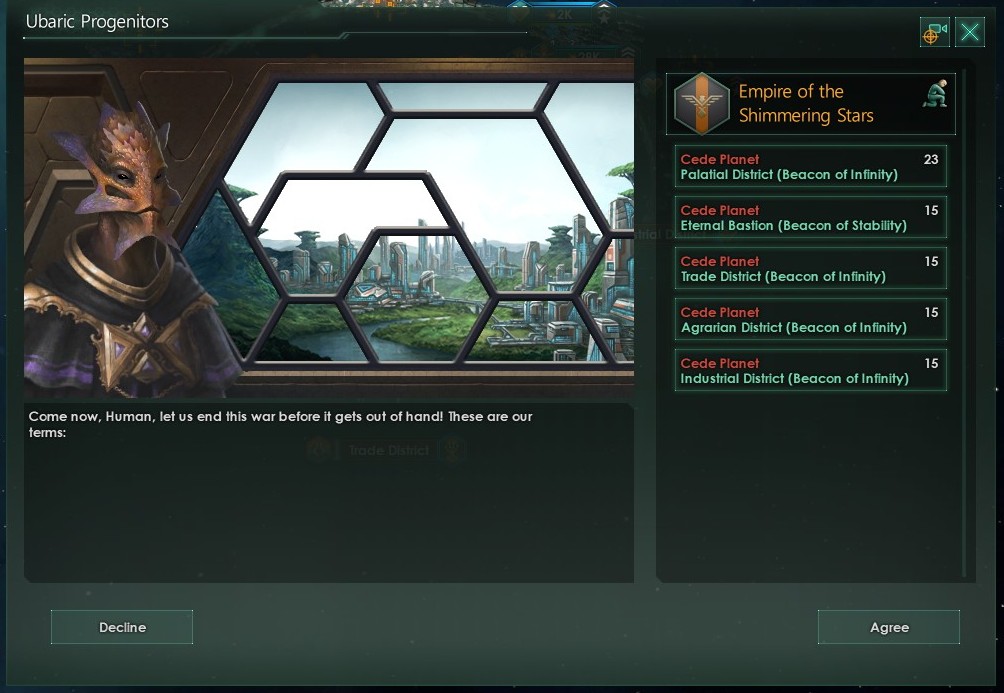 Humanity now presides over the galaxy’s dominant empire. No threats remain. The empire itself is home to many species, most co-existing happily, and its highest offices are open to leaders from all species. That, for me, is victory!
Humanity now presides over the galaxy’s dominant empire. No threats remain. The empire itself is home to many species, most co-existing happily, and its highest offices are open to leaders from all species. That, for me, is victory!
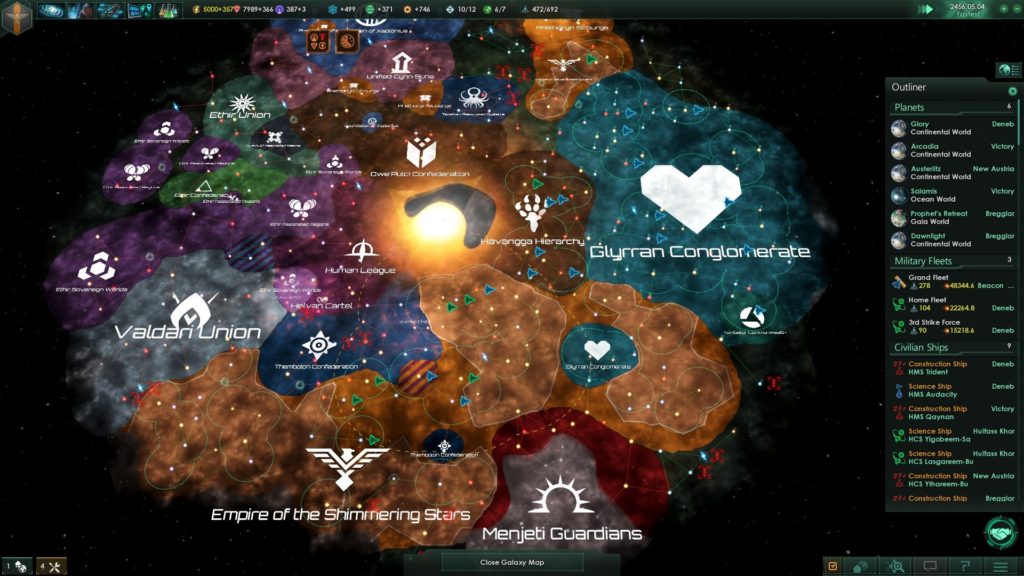 Good game, 1-2 expansions away from potential greatness. Stellaris’ appeal rested on two promises: (1) a vibrant science-fiction universe, and (2) blending Paradox’s specialty, the grand strategy game, with the established space 4X genre. It delivers on the first; I am not convinced it delivers on the second, as its limited internal politics feel more like a traditional 4X. I suspect players will enjoy it to the extent they’re looking for an interactive science fiction epic rather than a crunchy GSG. Overall, I enjoyed my 20 hours with Stellaris, and I look forward to playing again several patches down the road. (Update: the developers have posted their roadmap for the next few updates, which look great! They address many of my issues with the game.)
Good game, 1-2 expansions away from potential greatness. Stellaris’ appeal rested on two promises: (1) a vibrant science-fiction universe, and (2) blending Paradox’s specialty, the grand strategy game, with the established space 4X genre. It delivers on the first; I am not convinced it delivers on the second, as its limited internal politics feel more like a traditional 4X. I suspect players will enjoy it to the extent they’re looking for an interactive science fiction epic rather than a crunchy GSG. Overall, I enjoyed my 20 hours with Stellaris, and I look forward to playing again several patches down the road. (Update: the developers have posted their roadmap for the next few updates, which look great! They address many of my issues with the game.)
Below, I elaborate:
Strengths
Space opera brought to life. Better than many science fiction games, Stellaris takes advantage of its setting. It feels like science fiction: there are precursor artifacts, ringworlds (both inhabited and shattered), and multiple variants of the Sol system that can be discovered. You can uplift pre-sapient species, meddle with pre-spaceflight worlds, and genetically modify your own people. Your own people can genetically modify themselves!
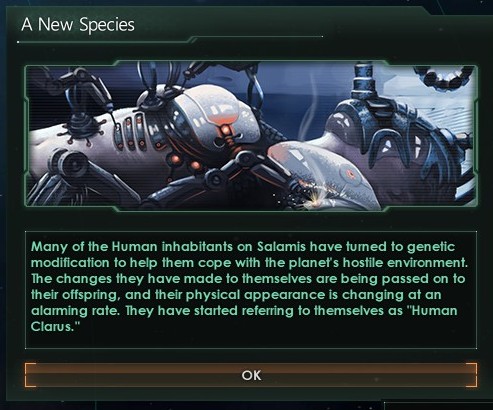 This approach manifests itself in several game mechanics. For instance, I love the way Stellaris represents multi-species empires — different species prefer different types of planet (and often start with different ethics). From a mechanical perspective, it gives players an incentive to expand – acquiring synergistic species – beyond growth for its own sake. And from a thematic perspective, it makes perfect sense.
This approach manifests itself in several game mechanics. For instance, I love the way Stellaris represents multi-species empires — different species prefer different types of planet (and often start with different ethics). From a mechanical perspective, it gives players an incentive to expand – acquiring synergistic species – beyond growth for its own sake. And from a thematic perspective, it makes perfect sense.
For another example, consider Fallen Empires. From a mechanical perspective, they’re superfluous – they keep to themselves unless provoked, and for most of the game, they’re far, far too strong to provoke. By the time I could beat the Ubari, I didn’t need the rewards. Essentially, they’re optional bosses for players who want a challenge. Their real value is thematic: they flesh out the galaxy as a place that existed long before the first player-controlled empire lifted off into space, and that will exist long after.
The music. This is perhaps Andreas Waldetoft’s best soundtrack to date: at times mysterious and tantalising, and triumphantly swelling at other times. I have it on loop as I type this.
Evocative little touches. This is the leader of the United Nations of Earth, the built-in “benevolent explorer” humans. Note the “classic science fiction” cut of her jumpsuit:
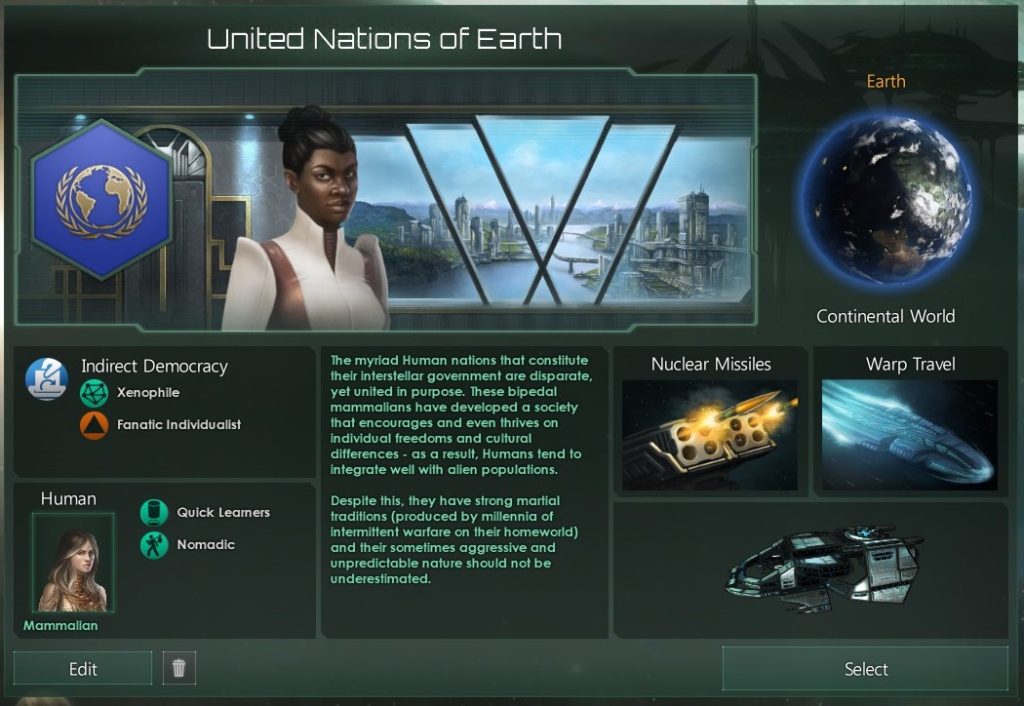 Now contrast the leader of the Commonwealth of Man, Stellaris’ human militarists1. Her uniform is overtly martial — and the wall behind her is a tactical display. One glimpse highlights the difference between these factions.
Now contrast the leader of the Commonwealth of Man, Stellaris’ human militarists1. Her uniform is overtly martial — and the wall behind her is a tactical display. One glimpse highlights the difference between these factions.
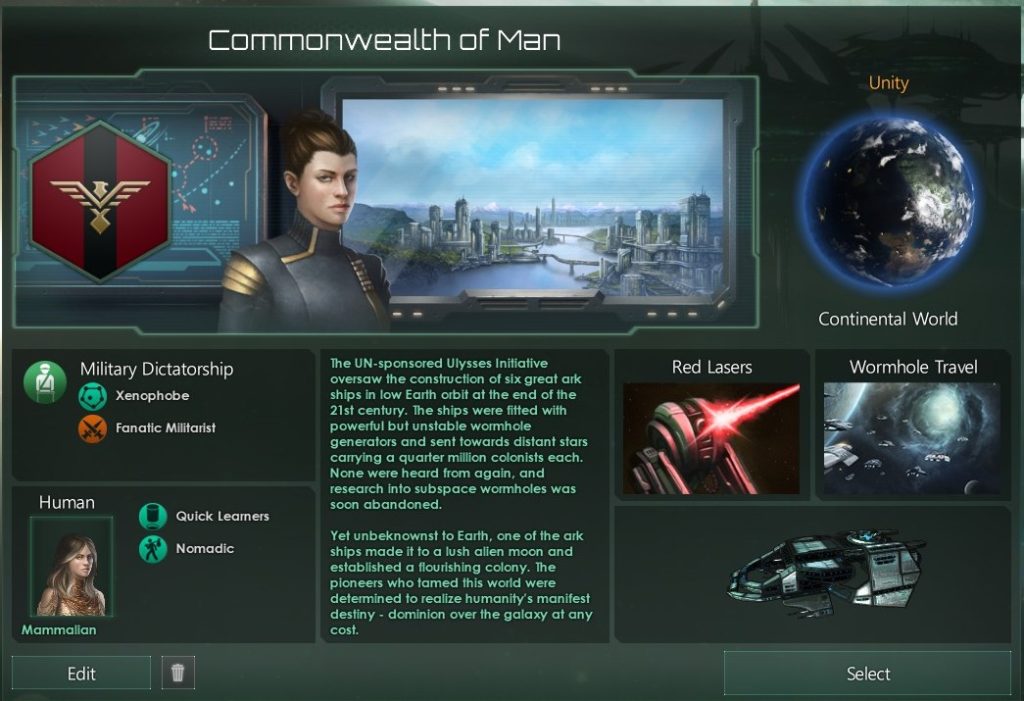 There are similarly cool touches in the flavour text. While the game usually refers to unidentified alien fleets as “Alpha Aliens”, “Beta Aliens”, and so on, the warlike Shimmering Stars classified unknown vessels as “Alpha Bogeys”.
There are similarly cool touches in the flavour text. While the game usually refers to unidentified alien fleets as “Alpha Aliens”, “Beta Aliens”, and so on, the warlike Shimmering Stars classified unknown vessels as “Alpha Bogeys”.
Areas for improvement
Internal politics – an obvious candidate for future expansion. Stellaris already contains the necessary framework, given that empires are populated by different ethics, factions, and species, and large empires are mostly delegated to computer-controlled sector governors. However, the peoples of my empire rubbed along pretty well (with the exception of the conquered Ubari), and as far as I can tell, the overall ethic/ideology of an empire is set in stone when the game begins.
Contrast Paradox’s Victoria series, in which political ideologies emerge over the nineteenth and early twentieth centuries. Different ideological groups in Victoria vote differently, and different political parties allow the player to enact different policies; I can see something similar working in Stellaris, where an empire’s founding ethics already have some effect on diplomacy and available domestic policies.
I also see potential to expand the ambit of sector governors, both from a UI/micromanagement and a gameplay perspective. Currently, governors manage sector planets and build starbases; however, they can’t expand those bases, or be ordered to settle new colonies. Those seem like obvious ways to cut down on micromanagement. Meanwhile, ambitious governors are an age-old space opera trope…
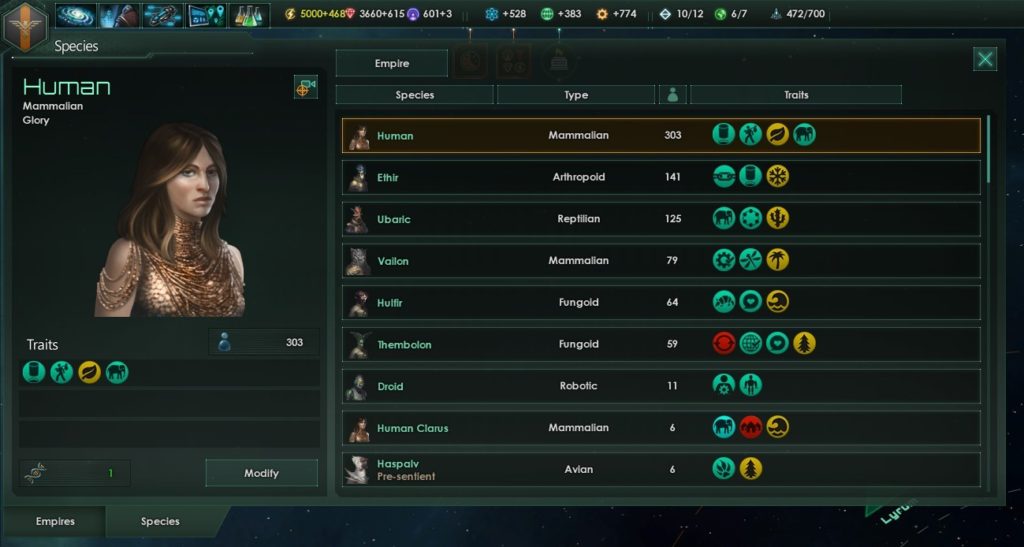 Victory conditions a disappointment. Currently, the game has two victory conditions – “eliminate all other players” and “colonise a huge proportion of the galaxy” — a recipe for the lategame grind that bedevils so many strategy games. I would like to see more varied victory conditions, and at the very least, customisable thresholds for the existing conditions.
Victory conditions a disappointment. Currently, the game has two victory conditions – “eliminate all other players” and “colonise a huge proportion of the galaxy” — a recipe for the lategame grind that bedevils so many strategy games. I would like to see more varied victory conditions, and at the very least, customisable thresholds for the existing conditions.
In particular, the absence of a diplomatic victory is odd, given Stellaris’ innovative alliance and Federation mechanics. Similarly, the absence of a science, quest, or wonder victory feels odd in a science fiction game where these can be justified with technobabble about transcendence and precusor artifacts.
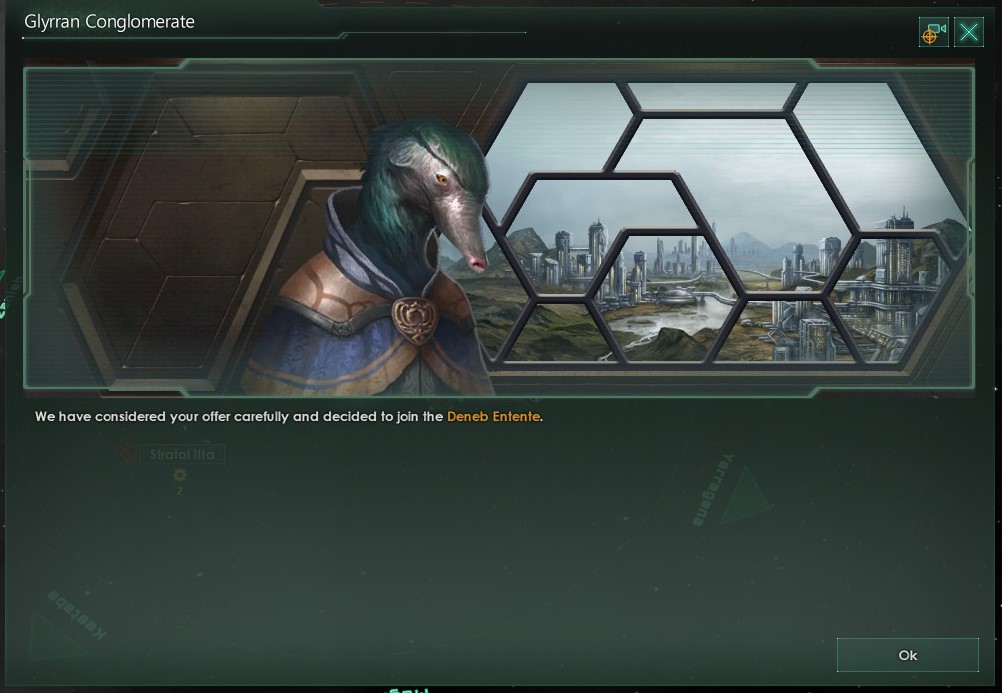 For now, I’ve simply set my own goals (in traditional Paradox GSG fashion), with the option of calling the game quits when I’m bored. With the Shimmering Stars unmatched, I consider the game won.
For now, I’ve simply set my own goals (in traditional Paradox GSG fashion), with the option of calling the game quits when I’m bored. With the Shimmering Stars unmatched, I consider the game won.
Other issues
Gameplay bugs need squashing. Several notable examples: on two occasions, my main fleet was ‘stuck’ in combat, unable to move or deal damage – I had to fix this by bringing up a second fleet. Had I not had a second fleet, this could have been a game-breaker. And one of the endgame menaces is currently bugged — I had to install a mod to fix it.
… and UI could do with a pass. While there’s a lot to like about the UI, it could do with Paradox’s traditional ledger (I’d especially like a sortable list of habitable planets within my borders), an auto-explore button, and a way to easily queue up construction at multiple space stations, similar to the army and navy recruitment buttons added later in Europa Universalis 4’s life cycle.
- The Empire of the Shimmering Stars is a tweaked version, minus the xenophobia. ↩
